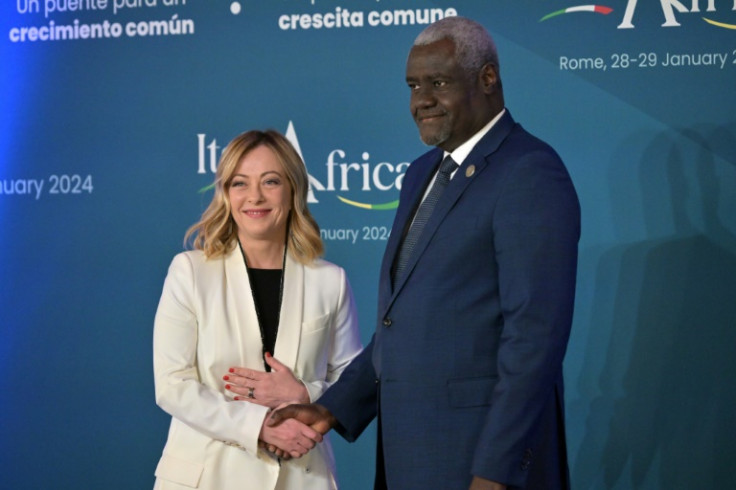
African leaders gathered at a Rome summit on Monday to hear Prime Minister Giorgia Meloni's much-hyped plan for the continent, aimed at transforming Italy into an energy hub -- and stopping migration.
Far-right leader Meloni, who came to power in 2022 on an anti-migrant ticket, has vowed to reshape relations with African countries by taking a "non-predatory" approach inspired by Enrico Mattei, founder of Italy's state-owned energy giant Eni.
The so-called Mattei Plan hopes to posit Italy as a key bridge between Africa and Europe, funnelling energy north while exchanging investment in the south for deals aimed at curbing migrant departures across the Mediterranean Sea.
Meloni said the plan would initially be funded to the tune of 5.5 billion euros ($5.9 billion), some of which would be loans, with investments focused on energy, agriculture, water, health and education.
Representatives of over 25 countries attended the summit on Monday at the Italian senate -- dubbed "A bridge for common growth" -- along with European Commission President Ursula von der Leyen and representatives of United Nations agencies and the World Bank.
Meloni told them that Europe and Africa's "destinies" were interconnected and she was determined to co-operate "as equals -- far from any predatory temptation, but also from that charitable approach to Africa that is ill-suited to its extraordinary potential for development".
There was no reference to Italy's colonial past in Libya, Ethiopia, Eritrea and what is now Somalia.
Guests included African Union Commission chair Moussa Faki Mahamat, Tunisian President Kais Saied, Senegal President Macky Sall, as well as the presidents of the Republic of Congo, Eritrea, Kenya, Mauritania, Mozambique and Zimbabwe.
Other countries, including Algeria, Chad, Egypt and the Democratic Republic of Congo (DRC), were represented by ministers.
The AU's Faki said Africa was "willing to discuss the content and implementation" of the plan but pointed out: "We would have liked to have been consulted beforehand."
Rome holds the presidency of the G7 group of nations this year and has vowed to make African development a central theme, in part to increase influence in a continent where powers such as China, Russia, India, Japan and Turkey have been expanding their political clout.
The summit comes just months after Russia held its own summit with African leaders.
Other countries, including China and France, have held similar initiatives.
Meloni said the Italian plan would start with a series of pilot schemes -- from modernising grain production in Egypt to purifying water in Ethiopia and providing training in renewable energies in Morocco -- with the aim of then extending them across the continent.
Von der Leyen described the plan as "complementary" to the European Union's own Africa package, unveiled in 2022 and worth 150 billion euros.
Meloni wants to transform Italy into an energy gateway, capitalising on demand from fellow European countries seeking to slash their dependence on Russian gas following Moscow's February 2022 invasion of Ukraine.
Critics say the plan appears too heavily focused on fossil fuels and have called instead for a renewable energy drive to supply the needs of the more than 40 percent of Africans who have no access to energy at all.
Rome's plan is to swap energy investments for efforts to curb migration.
Meloni, leader of the post-fascist Brothers of Italy party, and her main coalition partner, Matteo Salvini of the far-right League, have both vowed to stop migrant boats from North Africa.
But landings in Italy have in fact risen, from some 105,000 in 2022 to almost 158,000 in 2023.
African Union chairman Azali Assoumani said it was "essential that we work in complete synergy... to put an end to the often deadly migratory flows of Africans who have lost all hope of freedom in their respective countries on the continent".
The Central Mediterranean between North Africa and Italy is the world's deadliest migrant crossing.
Nearly 100 people have died or disappeared in the Central and Eastern Mediterranean since the beginning of 2024, the International Organization for Migration said on Monday.
The toll is more than twice as high as the figure for the same period of 2023, the deadliest year for migrants at sea in Europe since 2016, it said.
The Mattei Plan intends to tackle so-called push factors and persuade origin countries to sign readmittance deals for migrants refused permission to stay in Italy.







